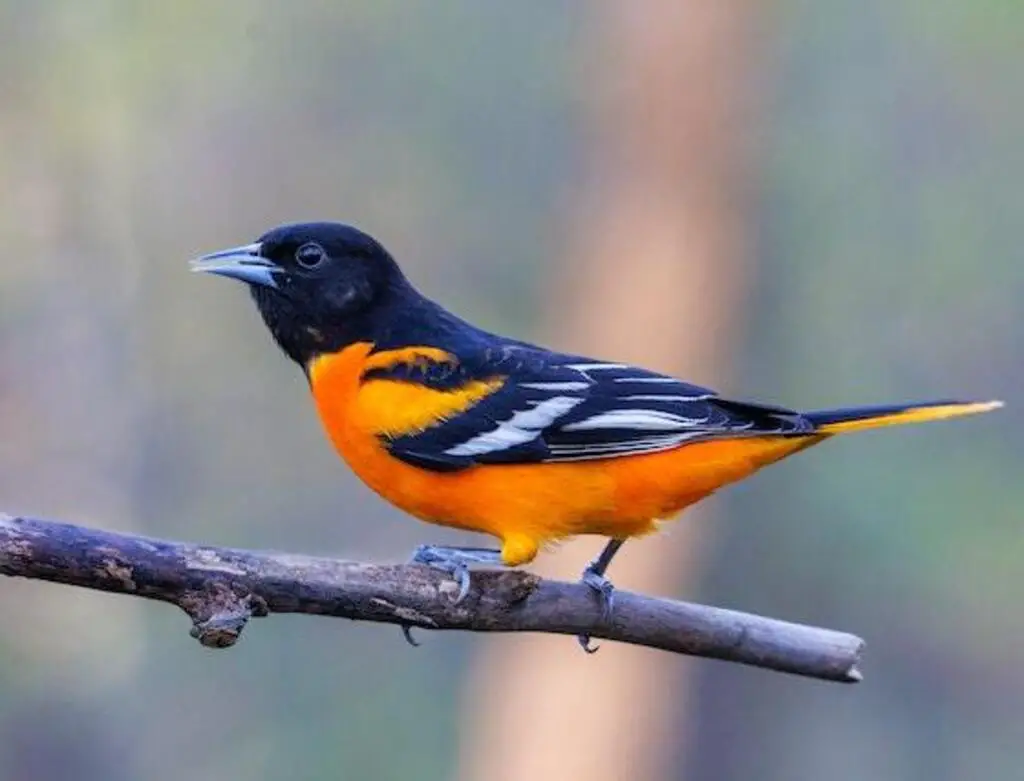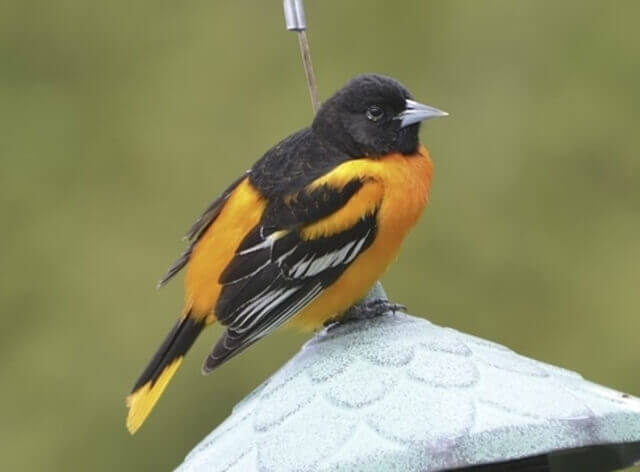Baltimore Orioles are a familiar sight in many parts of the United States, with their vibrant orange and black plumage and distinct songs.
As migratory birds, they spend their summers breeding and raising their young in the eastern half of North America before flying south for the winter.
One question that bird enthusiasts and nature lovers alike may have is what do Baltimore Orioles eat Elderberries?
Elderberries are a type of fruit that grows on shrubs and trees and has been used for medicinal purposes for thousands of years.
This article will explore the diet of Baltimore Orioles and whether elderberries are a part of it.
We will discuss the common foods that these birds eat, the nutritional value of elderberries, and any observations of Baltimore Orioles consuming this fruit.
Additionally, we will examine the role of elderberries in Baltimore Oriole migration and other fruits and berries that these birds are known to consume.
Finally, we will provide tips for attracting Baltimore Orioles to your yard, should you wish to enjoy their beauty and song more closely.
Table of Contents
- 1 Do Baltimore Orioles Eat Elderberries?
- 2 The Diet of Baltimore Orioles
- 3 The Common Foods Eaten by Baltimore Orioles
- 4 The Nutritional Value of Elderberries
- 5 Elderberries as a Potential Food Source for Baltimore Orioles
- 6 Observations of Baltimore Orioles Eating Elderberries
- 7 The Role of Elderberries in Baltimore Oriole Migration
- 8 Other Fruits and Berries Eaten by Baltimore Orioles
- 9 Tips for Attracting Baltimore Orioles to Your Yard
- 10 Frequently Asked Questions
- 10.1 How do Baltimore Orioles benefit from eating elderberries?
- 10.2 What other animals besides Baltimore Orioles eat elderberries?
- 10.3 Can elderberries be harmful to Baltimore Orioles or other birds if consumed in large quantities?
- 10.4 Are there any specific times of year when Baltimore Orioles are more likely to eat elderberries?
- 10.5 How do Baltimore Orioles select which elderberries to eat and which to avoid?
- 11 Conclusion
- 12 Author
Do Baltimore Orioles Eat Elderberries?
Yes, Baltimore Orioles do eat elderberries. Elderberries are one of several types of berries that orioles are known to enjoy, along with blackberries, blueberries, and others.
Orioles are attracted to ripe fruits and berries, and planting shrubs or trees that produce these fruits can be a good way to attract them to your yard.
It is important, however, to make sure that any fruits that you provide are safe for birds to consume, and have not been treated with pesticides or other harmful chemicals.
The Diet of Baltimore Orioles
The dietary habits of the Baltimore Oriole have been extensively studied and documented, shedding light on their feeding preferences and behavior.
Baltimore Orioles are primarily insectivores, with insects making up the majority of their diet during the breeding season.
They are known to feed on a wide variety of insects, including caterpillars, beetles, grasshoppers, and spiders.
Oriole feeding behavior is unique, as they are known for their acrobatic maneuvers while foraging for food.
Baltimore Orioles also consume nectar, fruit, and jelly, particularly during the non-breeding season when insects are less abundant.
They have a preference for sweet, sugary foods, and are often attracted to feeders containing sugar water, oranges, and grape jelly.
With this in mind, the common foods eaten by Baltimore Orioles are a combination of insects, nectar, fruit, and jelly.
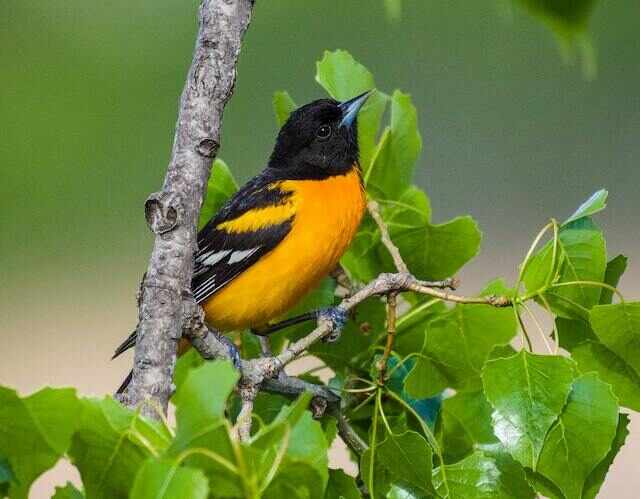
The Common Foods Eaten by Baltimore Orioles
What are the typical food sources for Baltimore Orioles?
Baltimore Orioles are primarily insectivores, but they also consume fruits and nectar. Their diet consists of insects such as beetles, caterpillars, and grasshoppers, as well as spiders and snails.
They also eat fruits such as berries, including elderberries, and nectar from flowers.
Baltimore Orioles are known to be attracted to brightly colored fruits and flowers. Their diet can vary depending on their location, nesting habits, migration patterns, and breeding seasons.
For example, during the breeding season, they may consume more insects to feed their young.
As for migration, they tend to switch to a more fruit-based diet during their wintering months in Central and South America. The nutritional value of elderberries will be discussed in the subsequent section.
The Nutritional Value of Elderberries
Elderberries provide a rich source of nutrients and antioxidants that are beneficial for human health. These small, dark purple berries are packed with vitamins A, B, and C, as well as potassium, calcium, and iron.
They are also high in flavonoids, which are powerful antioxidants that have been linked to a reduced risk of chronic diseases, such as heart disease and cancer.
Elderberries have a long history of use in traditional medicine, and are believed to have immune-boosting and anti-inflammatory properties.
In addition to their health benefits, elderberries also have culinary uses, and are often used to make jams, jellies, and syrups.
However, it is important to note that consuming raw elderberries can cause potential side effects, such as nausea and vomiting, and they should be cooked or processed before consumption.
Elderberries may also have potential as a food source for Baltimore Orioles, as they are known to eat a variety of fruits and berries.
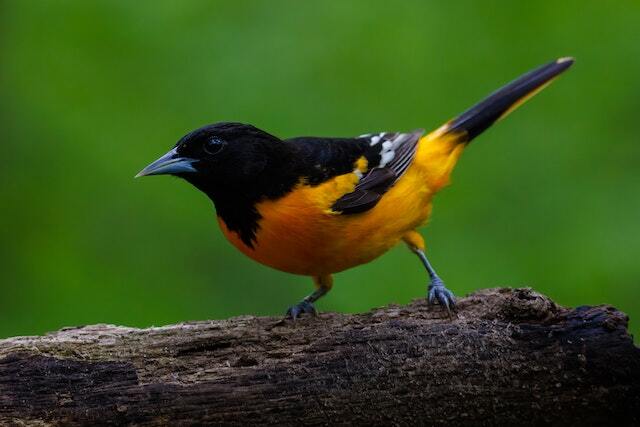
Elderberries as a Potential Food Source for Baltimore Orioles
Bearing small, dark purple fruits with high nutritional value, elderberry plants could serve as a potential food source for a certain species of birds that are known for their affinity towards a variety of berries.
However, before considering elderberries as a food source for birds such as Baltimore Orioles, it is important to note that elderberry plants contain toxic compounds such as cyanogenic glycosides, which can cause harm to birds if ingested in large quantities.
Therefore, careful cultivation and preparation of elderberries, such as cooking and removing seeds, is necessary to ensure the safety of birds that consume them.
Moreover, elderberries can be used in various recipes, such as jams, jellies, and syrups, which can be a great source of nutrition for birds during their migratory journeys.
Observations of Baltimore orioles eating elderberries have been reported, suggesting that these birds may have adapted to consuming elderberries in a safe and efficient manner.
Observations of Baltimore Orioles Eating Elderberries
The consumption of elderberry plants by certain bird species, as evidenced by observations of their feeding behavior, highlights the potential of elderberries as a versatile food source for avian populations.
Observing behavior in the wild, researchers have noted the consumption of elderberries by Baltimore Orioles, among other birds.
In fact, elderberries may play a role in the migration patterns of Baltimore Orioles, as these birds typically consume large amounts of the fruit before embarking on their long journey south for the winter.
Additionally, elderberries are known to have several health benefits for birds, including high levels of antioxidants and vitamins.
Overall, the observations of Baltimore Orioles eating elderberries suggest that these plants may be an important resource for avian populations, and further research is needed to fully understand their role in bird diets and migration patterns.
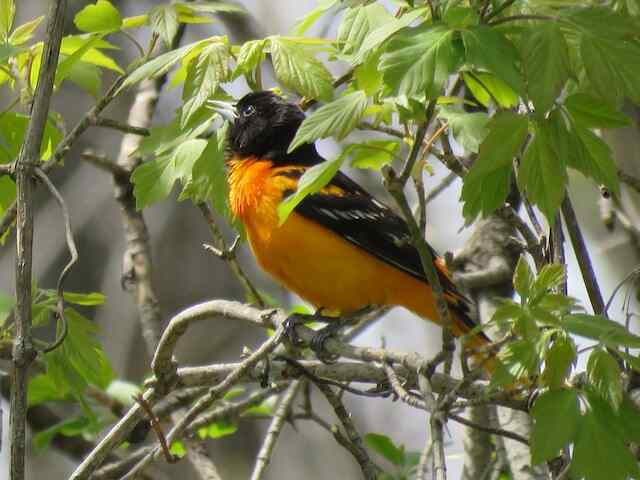
The Role of Elderberries in Baltimore Oriole Migration
While observations of Baltimore Orioles eating elderberries have been reported, the role of this fruit in their migration patterns and ecological significance remains an area of interest for ornithologists.
Elderberries are known to be a source of energy and nutrition for birds during migration, and it is possible that Baltimore Orioles rely on elderberries during their long journeys.
Understanding the bird behavior and ecological significance of elderberries in Baltimore Oriole migration can provide insights into the conservation of this species and the ecosystems they inhabit.
However, elderberries are not the only fruit or berry that Baltimore Orioles consume, and further research is needed to fully understand their dietary preferences.
Other Fruits and Berries Eaten by Baltimore Orioles
Exploring the diverse range of fruit and berries consumed by Baltimore Orioles can provide crucial insight into their dietary habits and their role in maintaining the ecosystem.
While elderberries do play a significant role in the migration patterns of Baltimore Orioles, they are not the only fruit consumed by these birds.
Orioles are also known to consume blueberries and strawberries, but their preferences may vary based on the region and seasonal availability of fruit.
Understanding the dietary habits of Baltimore Orioles can be useful for attracting them to your yard. In the next section, we will discuss tips for creating an environment that is attractive to these beautiful birds.
Tips for Attracting Baltimore Orioles to Your Yard
While Baltimore Orioles are known to eat a variety of fruits and berries, including elderberries, attracting them to your yard can be a challenge.
However, there are several tips that can help you create an environment that is attractive to these beautiful birds.
One way to attract birds is by providing them with a birdhouse that is designed specifically for their needs.
Additionally, incorporating water features, such as a bird bath or fountain, can also be effective in attracting birds to your yard.
By creating a welcoming environment for Baltimore Orioles, you can enjoy the beauty of these birds up close and personal.
Frequently Asked Questions
How do Baltimore Orioles benefit from eating elderberries?
Baltimore Orioles are migratory birds that exhibit specific habitat preferences and dietary habits. These birds are known to favor deciduous forests, orchards, and suburban landscapes.
In terms of food, Baltimore Orioles have a diverse diet consisting of insects, fruits, and nectar.
Elderberries are one of the fruits that Baltimore Orioles commonly consume during their migration, as they are a rich source of nutrients.
The consumption of elderberries can provide several benefits to these birds, such as boosting their immune system and aiding in digestion.
Additionally, the high sugar content in elderberries provides the necessary energy for these birds to complete their long migration journeys.
Overall, the consumption of elderberries is just one of the many dietary habits that Baltimore orioles utilize to thrive during their migration patterns and habitat preferences.
What other animals besides Baltimore Orioles eat elderberries?
Elderberry consumption by animals is a common occurrence in the wild, with several species actively foraging for these berries.
Some of the animals that have been observed consuming elderberries include birds, such as the cedar waxwing and American robin, as well as small mammals like raccoons and bears.
Elderberry distribution in the wild is widespread, with these plants found in various habitats such as forests, wetlands, and meadows.
Harvesting techniques for elderberries vary by species, with some animals using their beaks or claws to pluck the berries from the plant, while others may shake the plant to dislodge the fruit.
Overall, elderberry consumption by animals plays an important role in the ecosystem, helping to disperse seeds and contribute to the health of wildlife populations.
Can elderberries be harmful to Baltimore Orioles or other birds if consumed in large quantities?
Elderberries have been a subject of interest in the context of bird diets, particularly for species like Baltimore Orioles.
While elderberries are a nutritious food source for many avian species, there is a concern that excessive consumption can have adverse effects on their health.
Studies have shown that elderberries contain toxic compounds that can cause gastrointestinal distress, neurological symptoms, and even death in birds.
However, the susceptibility of birds to these negative effects can vary depending on factors such as age, sex, and overall health.
Additionally, the ecological impact of birds’ feeding habits on elderberry plants and their role in the wider ecosystem is worth exploring.
Lastly, the cultural significance of elderberries and their use in different traditions and beliefs further highlights their importance beyond their nutritional value.
Are there any specific times of year when Baltimore Orioles are more likely to eat elderberries?
Baltimore Orioles are known to have a varied diet that includes fruits, nectar, insects, and spiders. While elderberries are not a staple food for these birds, they have been observed feeding on them during certain times of the year.
The availability of elderberries may play a role in their foraging behavior, as these berries tend to ripen in late summer and early fall.
Additionally, Baltimore Orioles may exhibit seasonal preferences for certain foods, such as nectar in the spring and early summer and fruits in the late summer and fall.
Therefore, it is possible that Baltimore Orioles may be more likely to eat elderberries during the late summer and fall, when these berries are more abundant.
Further research is needed to confirm these observations and to determine the extent of Baltimore Orioles’ consumption of elderberries.
How do Baltimore Orioles select which elderberries to eat and which to avoid?
When it comes to elderberry selection, Baltimore Orioles are known to have specific taste preferences. They often choose elderberries that are firm, fully ripe, and have a deep purple color.
Oriole taste preferences are also influenced by the nutritional benefits of elderberries, which are high in antioxidants, vitamins, and minerals.
While there is no specific research on how orioles select which elderberries to eat and which to avoid, it is likely that they rely on visual cues and taste to make their choices.
Additionally, it is possible that orioles may avoid elderberries that have been affected by disease or pests, as these can negatively impact the quality and nutritional value of the fruit.
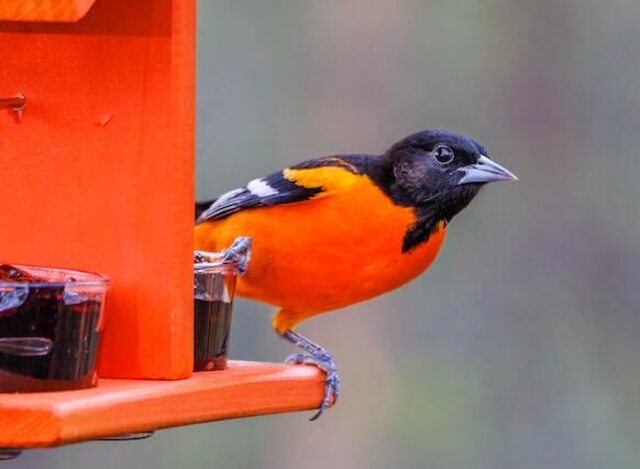
Conclusion
Baltimore Orioles are known to have a varied diet that consists of insects, nectar, and fruits. While they are often observed feeding on a variety of berries and fruits, the nutritional value of elderberries makes them a potential food source for these birds.
Elderberries are rich in vitamins, minerals, and antioxidants, which are essential for the bird’s health and wellbeing.
Observations have shown that Baltimore Orioles do consume elderberries, which suggests that these berries play a role in their diet.
Elderberries also have a significance in Baltimore Oriole migration. The birds are known to migrate from North America to Central America and the Caribbean during fall.
Elderberries, being a source of energy, are crucial for these birds during their long and arduous journey. Other fruits and berries that are commonly eaten by Baltimore Orioles include wild cherries, mulberries, and raspberries.
As the adage goes, ‘you are what you eat.’ The diet of Baltimore Orioles plays a crucial role in their overall health and wellbeing.
Elderberries, being a rich source of nutrients, are not only a potential food source for these birds but also play a vital role in their migration.
By providing a variety of fruits and berries in our yards, we can attract these beautiful birds and help them thrive.
Understanding the dietary habits of birds like Baltimore Orioles can help us create a more sustainable and bird-friendly environment.

